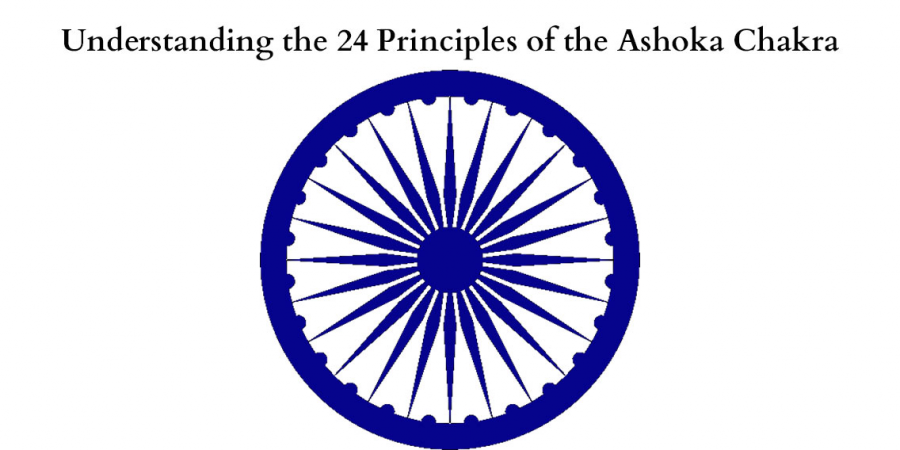

The Ashoka Chakra, featured prominently on the Indian national flag, is not just a symbol of India's sovereignty, but also embodies a set of timeless principles imparted by Emperor Ashoka, an ancient ruler of India. These principles, inscribed on the Ashoka Chakra, serve as guiding lights for individuals and nations alike, promoting peace, harmony, and righteousness. Let's explore these 24 principles in simple language to understand their significance in today's world.
A. Non-violence (Ahimsa) : Ashoka believed in peace and avoiding harm to others, both physically and emotionally.
B. Tolerance (Sarva Dharma Samabhava) : He respected all religions and believed in religious harmony.
C. Kindness (Karuna) : Ashoka promoted compassion and empathy towards all living beings.
D. Truthfulness (Satya) : He emphasized honesty and integrity in all aspects of life.
E. Justice (Dharma) : Ashoka upheld fairness and justice in governance and society.
F. Equality (Samata) : He advocated for equal rights and opportunities for all, regardless of caste or social status.
G. Respect (Vinaya) : Ashoka valued humility and respect towards others, especially elders and teachers.
H. Gratitude (Kritajna) : He encouraged gratitude and appreciation for the kindness of others.
I. Generosity (Dana) : Ashoka believed in the importance of giving and helping those in need.
J. Forgiveness (Kshama) : He promoted forgiveness and reconciliation, even towards enemies.
K. Self-discipline (Sama) : Ashoka emphasized self-control and moderation in behavior and desires.
L. Patience (Dhriti) : He valued patience and perseverance in overcoming challenges.
M. Contentment (Santosh) : Ashoka taught the importance of finding happiness and satisfaction in what one has.
N. Humble Living (Parigraha) : He encouraged simplicity and frugality in lifestyle and possessions.
O. Environmental Protection (Paryavaran Raksha) : Ashoka was concerned about environmental conservation and the welfare of animals.
P. Education (Shiksha) : He supported education for all, promoting the spread of knowledge and learning.
Q. Public Welfare (Lok Kalyan) : Ashoka focused on the welfare and well-being of his subjects, providing for their needs.
R. Good Governance (Sushasan) : He believed in efficient and just governance, with a focus on the welfare of the people.
S. Community Service (Seva) : Ashoka encouraged community service and volunteering to help others.
T. Social Harmony (Samajik Samriddhi) : He aimed to create a society based on cooperation, mutual respect, and harmony.
U. National Unity (Rashtriya Ekta) : Ashoka promoted unity and integration among diverse communities and regions.
V. Global Peace (Vishwa Shanti) : He aspired for peace and harmony not only within his empire but also beyond its borders.
W. Personal Transformation (Atma Vikas) : Ashoka believed in self-improvement and spiritual growth as pathways to a better society.
X. Legacy of Ashoka (Ashoka Ki Virasat) : His principles continue to inspire people worldwide, emphasizing the timeless values of compassion, tolerance, and peace.
Conclusion :
The 24 principles of the Ashoka Chakra, rooted in ancient Indian wisdom, offer timeless guidance for living a virtuous and fulfilling life. By embodying these principles in our thoughts, words, and actions, we can contribute to a more harmonious and compassionate world, just as Emperor Ashoka envisioned centuries ago. Let us strive to uphold these principles in our daily lives, fostering peace, righteousness, and universal brotherhood for generations to come.


